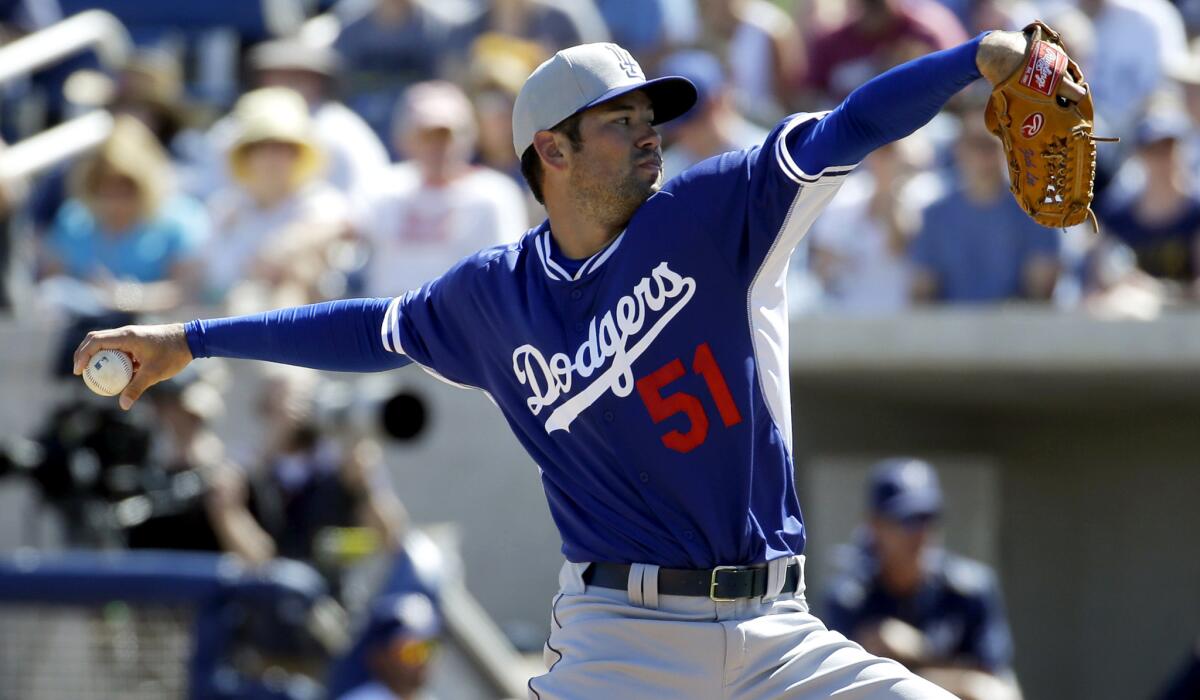Dodgers’ Zach Lee, Chris Reed get second chances for first impressions

- Share via
Reporting from Phoenix — Zach Lee and Chris Reed sat down to stretch Saturday morning on the outfield grass of a practice field between the minor and major league clubhouses at the Dodgers spring training complex.
For the pitchers, both former first-round draft picks, that seemed appropriate since that’s where both their careers appear to have stalled: between the minors and the majors.
Five years after spurning an offer to play quarterback at Louisiana State in favor of a $5.25-million bonus to sign with the Dodgers, Lee has a 32-35 record and 4.16 earned-run average at four minor league stops. Once rated as the Dodgers’ top prospect by Baseball America, Lee no longer ranks among the top 10.
Four years after leaving Stanford and agreeing to a $1.6-million bonus, Reed has a minor league record of 9-31 with a 4.12 ERA. The Dodgers’ No. 5 prospect three years ago, he started this year ranked ninth.
Yet for both this spring marks a new beginning. Gone is Logan White, the assistant general manager for scouting, and Dejon Watson, the player development chief, who drafted and helped develop them. In are an entirely new front office and a new player development director in former big league player Gabe Kapler.
“It’s not necessarily a step back, not necessarily a step forward,” said Lee, a 23-year-old right-hander who has pitched just twice this spring, giving up a hit in four innings. “Obviously coming from the old regime, where they knew exactly what I was capable of, this is kind of an opportunity for me to show some things that I can do.”
Reed, a 24-year-old left-hander, is taking much the same approach. But he’s also taking added comfort from the fact Kapler is promising to look beyond the stats to find out what those numbers really mean.
“They’re not looking at just ERA. They’re looking at things that you can actually control,” said Reed, who has given up a run and two hits in three innings of relief this spring. “I like that a lot. A lot of times you get caught up in your numbers. You’re like, ‘Oh God, I just gave up all those runs.’
“But in reality it’s a little blooper over the shortstop. You can’t control that.”
Nor can either pitcher control what the front office does, so they’re trying not to read too much into the team’s decision to sign three starting pitchers over the winter, giving them three more arms to climb over on their way to the majors.
But they can control what they take away from their struggles. Which is why Lee considers last season — statistically his worst as a pro, with a 7-13 record and 5.39 ERA at triple-A Albuquerque — a positive experience.
“Pitching in more of a hitter’s ballpark, I really learned that I had to find ways to get balls on the ground,” said Lee, who set career highs with 27 starts and 150 innings pitched. “I couldn’t rely on just weak contact off bats for fly balls. I had to get the ball on the ground.
“In doing so, some of my pitches really improved.”
And that, as it turns out, is exactly the kind of development Kapler is looking for.
“Players,” he said, “are evaluated on their talent, performance, flexibility, communication and teammate behavior independent of their current or prior status.”
Notice he said nothing about records.
Twitter: @kbaxter11
More to Read
Are you a true-blue fan?
Get our Dodgers Dugout newsletter for insights, news and much more.
You may occasionally receive promotional content from the Los Angeles Times.











